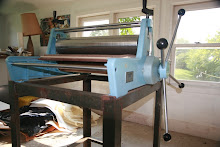Monday, May 25, 2009
Don't Give Up on Single Payer Health Care
I love our President but.....it's time for us to put pressure on President Obama to consider single payer health care among the options for reform. Follow the rallies, organize for single payer options in Pennsylvania and elsewhere. Don't let the bad guys push us around. Single payer may not seem like a political option but it's as simple as this: you go to your doctor, you present your US health card, and the doctor gets paid by a state or local agency. He/she doesn't have to fight with for profit health companies for his pay. He/she doesn't have to argue about recommended treatment. Support single payer, lower your costs and raise your options.
Tuesday, May 19, 2009
Straight Talk to Beat Crooked Reasoning
National legislation to curb credit card abusive rip-offs of consumers, and the Administration's new gasoline standards have drawn the usual crooked responses from business opponents. The credit card companies are suddenly worried about your ability to get credit and the car makers are warning of higher automobile costs. Credit card companies have been allowed to run wild with inexplicable charges, interest rate hikes and fees. They don't care if you don't pay, they don't care if you're lured into using your credit card like an open money pit, they just want to be able to make as much money off your irresponsibility as they can. They welcome non payers, they frown on prompt payers. Soooo how come they are suddenly so worried about your ability to get credit? Follow the money and you'll see why. If you're a smart consumer and a smart voter you'll tell your members of congress you want prompt passage and prompt enforcement date...give them at the most 90 days between enactment for the bill to go into effect. And meanwhile, cut up some of those credit cards.
The new gas standards will help everyone's personal economy ... the additional cost of developing the vehicle will be quickly offset by fuel savings. The Administration estimates that you'll get back the difference between slightly higher vehicle costs and today's vehicle costs within three years. And best of all it's good for the environment.
Isn't it interesting that conservatives always worry about the impact of Federal debt on future generations, but never mention the impact of global warming on future generations or, the impact of credit debt on families. Shame on them. But you don't have to fall for their crooked reasoning. Think straight!
The new gas standards will help everyone's personal economy ... the additional cost of developing the vehicle will be quickly offset by fuel savings. The Administration estimates that you'll get back the difference between slightly higher vehicle costs and today's vehicle costs within three years. And best of all it's good for the environment.
Isn't it interesting that conservatives always worry about the impact of Federal debt on future generations, but never mention the impact of global warming on future generations or, the impact of credit debt on families. Shame on them. But you don't have to fall for their crooked reasoning. Think straight!
Tuesday, May 5, 2009
Falling Wages, Failing Newspapers
I'm worried! How do you build a successful American economy when people's wages are being cut and the security they created throught their unions, their home equity and their health care benefits is constantly eroded. I'm not alone. NY Times columnist and Nobel Laureate Paul Krugman is worried too. See his column reprinted here. And most ironically the newspaper of record The New York Times, is about to create a terrible hole in American journalism by selling off or shutting down The Boston Globe, another preeminent newspaper. What do you think?
By PAUL KRUGMAN
Published: May 3, 2009
Wages are falling all across America. Some of the wage cuts, like the givebacks by Chrysler workers, are the price of federal aid. Others, like the tentative agreement on a salary cut here at The Times, are the result of discussions between employers and their union employees. Still others reflect the brute fact of a weak labor market: workers don’t dare protest when their wages are cut, because they don’t think they can find other jobs.
Whatever the specifics, however, falling wages are a symptom of a sick economy. And they’re a symptom that can make the economy even sicker.
First things first: anecdotes about falling wages are proliferating, but how broad is the phenomenon? The answer is, very.
It’s true that many workers are still getting pay increases. But there are enough pay cuts out there that, according to the Bureau of Labor Statistics, the average cost of employing workers in the private sector rose only two-tenths of a percent in the first quarter of this year — the lowest increase on record. Since the job market is still getting worse, it wouldn’t be at all surprising if overall wages started falling later this year.
But why is that a bad thing? After all, many workers are accepting pay cuts in order to save jobs. What’s wrong with that?
The answer lies in one of those paradoxes that plague our economy right now. We’re suffering from the paradox of thrift: saving is a virtue, but when everyone tries to sharply increase saving at the same time, the effect is a depressed economy. We’re suffering from the paradox of deleveraging: reducing debt and cleaning up balance sheets is good, but when everyone tries to sell off assets and pay down debt at the same time, the result is a financial crisis.
And soon we may be facing the paradox of wages: workers at any one company can help save their jobs by accepting lower wages, but when employers across the economy cut wages at the same time, the result is higher unemployment.
Here’s how the paradox works. Suppose that workers at the XYZ Corporation accept a pay cut. That lets XYZ management cut prices, making its products more competitive. Sales rise, and more workers can keep their jobs. So you might think that wage cuts raise employment — which they do at the level of the individual employer.
But if everyone takes a pay cut, nobody gains a competitive advantage. So there’s no benefit to the economy from lower wages. Meanwhile, the fall in wages can worsen the economy’s problems on other fronts.
In particular, falling wages, and hence falling incomes, worsen the problem of excessive debt: your monthly mortgage payments don’t go down with your paycheck. America came into this crisis with household debt as a percentage of income at its highest level since the 1930s. Families are trying to work that debt down by saving more than they have in a decade — but as wages fall, they’re chasing a moving target. And the rising burden of debt will put downward pressure on consumer spending, keeping the economy depressed.
Things get even worse if businesses and consumers expect wages to fall further in the future. John Maynard Keynes put it clearly, more than 70 years ago: “The effect of an expectation that wages are going to sag by, say, 2 percent in the coming year will be roughly equivalent to the effect of a rise of 2 percent in the amount of interest payable for the same period.” And a rise in the effective interest rate is the last thing this economy needs.
Concern about falling wages isn’t just theory. Japan — where private-sector wages fell an average of more than 1 percent a year from 1997 to 2003 — is an object lesson in how wage deflation can contribute to economic stagnation.
So what should we conclude from the growing evidence of sagging wages in America? Mainly that stabilizing the economy isn’t enough: we need a real recovery.
There has been a lot of talk lately about green shoots and all that, and there are indeed indications that the economic plunge that began last fall may be leveling off. The National Bureau of Economic Research might even declare the recession over later this year.
But the unemployment rate is almost certainly still rising. And all signs point to a terrible job market for many months if not years to come — which is a recipe for continuing wage cuts, which will in turn keep the economy weak.
To break that vicious circle, we basically need more: more stimulus, more decisive action on the banks, more job creation.
Credit where credit is due: President Obama and his economic advisers seem to have steered the economy away from the abyss. But the risk that America will turn into Japan — that we’ll face years of deflation and stagnation — seems, if anything, to be rising.
Subscribe to:
Posts (Atom)






